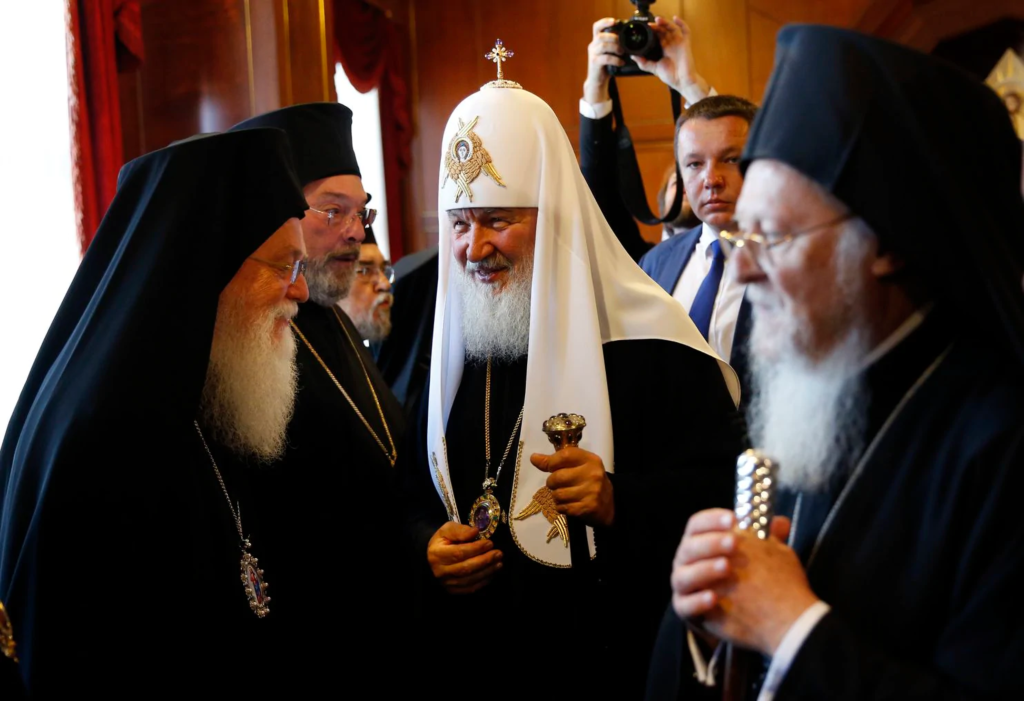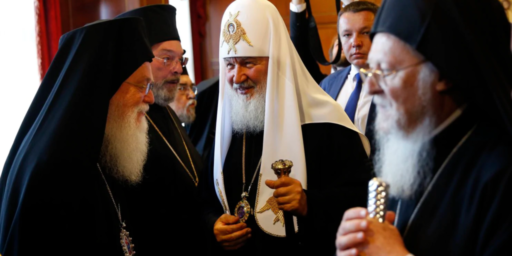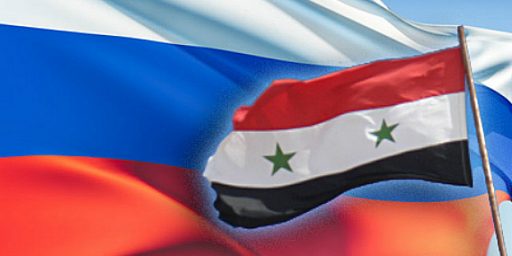A Nationalist Split In Eastern Orthodoxy With Roots In The Russia-Ukraine Crisis
The Ukrainian branch of the Russian Orthodox Church is pushing for independence. Church leaders in Moscow are not too happy about this.

The Ecumenical Patriarch of the Orthodox Church is on the verge of taking a step that Russia is not going to like, and the leaders of the Russian Orthodox Church aren’t happy about it:
Ukraine’s president on Thursday hailed the announcement by Orthodoxy’s Ecumenical Patriarchate of Constantinople that it will move forward with granting Ukrainian clerics independence from the Russian Orthodox Church, while the Russian church denounced the decision.
The Istanbul-based patriarchate, whose head Bartholomew I is considered the “first among equals” of Orthodox church leaders, said it was removing its conde mnation of leaders of schismatic Orthodox churches in Ukraine, a step toward establishing an ecclesiastically independent — or autocephalous — church in Ukraine.
Since the late 1600s, the church in Ukraine has been formally under the jurisdiction of the Russian Orthodox Church.
President Petro Poroshenko has pushed for the church in Ukraine to be independent.
“For us, our own church is a guarantee of our spiritual freedom,” Poroshenko said. “I guarantee that the Ukrainian state will respect the choice of those who decide to stay in church structures retaining unity with the Russian Orthodox Church.”
The Russian church, the world’s largest Orthodox grouping, was furious.
“With its actions, Constantinople is crossing a red line and catastrophically undermines the unity of global Orthodoxy,” said Alexander Volkov, a spokesman for Russian church leader Patriarch Kirill. The Russian church has said it will no longer regard the Ecumenical Patriarch as first among equals if the Ukrainian church is recognized as legitimate.
Ukraine currently has three Orthodox communities — those that stay under Moscow’s control and two schismatic churches.
The leader of the larger of the two schismatic churches, Patriarch Filaret, said he would call a council with the leadership of the other schismatic church to choose a leader of the autocephalous church. Moscow-loyal church representatives can attend if they desire, he said.
Rod Dreher, who is Orthodox himself, wrote about this issue back in September when the idea was first being floated:
The two great rival churches in Orthodoxy are the Greeks and the Russians. This goes back many centuries. In Orthodox ecclesiology, the Patriarch of Byzantium has historically been considered the first among equals. Orthodoxy does not have a pope; it’s ruled collegially, by synods. The Byzantine patriarch is more like the Archbishop of Canterbury in that way. After Byzantium fell to the Ottomans, the Moscow — the Russian church — became the de facto great power in world Orthodoxy. The Byzantine patriarch — now called the Ecumenical Patriarch — has continued on all these years as a figurehead. The current one, Bartholomew, lives in a small quarter in Istanbul. Unlike Moscow, he has no money, but he does have the power, by virtue of his office, to grant “autocephaly” — the right to self-rule — to national churches in communion with his See.
(I have probably oversimplified this explanation. Forgive me. It’s complicated.)
So, the crisis coming to a head right now threatens to split world Orthodoxy. Since Russia and Ukraine began fighting, a large number of Ukraine-based Orthodox parishes have wanted to break away from the Moscow Patriarchate and form a Ukrainian Orthodox patriarchate — a national church independent from Moscow. Moscow has fought this hard. For one, a huge number of parishes of the Russian Orthodox Church are in Ukraine. To lose them would be a big, big blow to Moscow. For another, Ukraine is the birthplace of Russian Orthodoxy, in the 10th century. It is hard to overstate how much this means to Russian Orthodoxy, on an emotional and symbolic level.
But if the breakaway Ukrainian Orthodox bishops ask the Ecumenical Patriarch for autocephaly, he can grant it — and, according to this report today, is moving very quickly to do that. If this happens, there will almost certainly be a schism between Moscow and the Ecumenical Patriarchate. World Orthodoxy will likely split along lines of those faithful to the EP, and those who align with Russia.
Leaving aside the admittedly weird internal politics and nationalism of the Orthodox Church, much of what we’re seeing here seems to be an outgrowth of the conflict that has been going on between Ukraine and Russia ever since the events of 2014. During that time period, we saw the pro-Russian government in Kiev booted out of power after massive protests and allegations of corruption against former Ukrainian President Viktor Yushchenko and which was quickly followed by the Russian annexation of Crimea via a referendum that every independent observer agrees was entirely illegitimate. Since then, the Russians have been backing pro-Russian separatists in the Eastern part of Ukraine and have apparently been sending troops across the border to assist those separatists in their battles. In no small part, this is because Russia still doesn’t fully recognize the independence of Ukraine as an entity or ethnic group outside of Russia. Partly, this is due to the fact that the roots of Russia, and of the Russian Orthodox Church, can be found in what happened in Ukraine more than 1,000 years ago before making its way eastward. In part, it’s due to the fact that, prior to 1991, there was no such thing as an independent Ukraine although Ukrainian nationalism was a strong force during the years of Soviet dominance, something that led Josef Stalin to undertake a mass starvation campaign that killed millions of Ukrainians in the 1920s.
In addition to the political history between Russia and Ukraine, the other factor that appears to be at play here is a matter of internal church politics between the Russian Orthodox Church and the Greek Orthodox Church, something that goes back centuries and is largely attributable to the fact that, unlike the Roman Catholic Church, there is no overall unifying voice and, as a result, the Church has broken down into nationalist spinoffs that tend to go their own ways at times. In the case of the Russian Orthodox Church, this has included a tendency to ally itself with whoever happens to be in power in Moscow at a given point in time whether it be the Czars, the Soviets, or Vladimir Putin. As a result, it’s not hard to believe that the Russian Church’s response to this is based as much in its desire to curry favor of Putin as it is to their own objections to the existence of an independent Ukranian Orthodox Church.





I only hope that the CIA has taken to social media to push this split.
The Orthodox church has been allied to power since its beginning, which can be dated to the Great Schism in 1054. This is due to the simple fact that by then Rome was more or less a backwater in world affairs, while Constantinople was the seat of the Eastern Roman Empire, by then simply the Roman Empire, and known to us as the Byzantine Empire (Constantinople was originally called Byzantium; now it’s called Istanbul).
So the Patriarch in Constantinople had a powerful emperor with control of the purse strings. The math gets pretty simple then.
This latest kerfuffle would seem like a good opportunity for the Russian church to distance itself from Putin. Realistically, there’s no distancing one’s self from Putin while he remains in power. So it might as well change it’s name to the Church of the Most Holy St. Vlad and be done.
Any time politics and religion enter a room together, only politics comes back out. See: white evangelical Christians.
@Michael Reynolds:
I once asked a Texan acquaintance why southerners and midwesterners were so eager to establish a candidate’s religious bona fides. She replied that they believe it to be a sign of good character.
@iSeeDumbPeople: Moscovy conquered Kiyvan Rus and illegally transferred the Orthodox Metropolinate from Kiyv to Novograd and later Moscow. The Tzars and Russian Communists used the Russian Orthodox Church to control the multinational nations,
@Michael Reynolds: Russia, Tzarist, Communist or Putinist has used the Russian Orthodox Church as a political tool to control Russian and non-Russian nationalities. The church says follow the corrupt government and the government corrupts the Russian Orthodox Church. It is well know that to be ordained an Orthodox priest or bishop you had to be “approved” by the Cheka, MVD, NKVD, KGB and now FSB.
@iSeeDumbPeople: I take it that you write your posts while looking in a mirror.
Anything that would push back and curb the machinations of Putin must be a good thing (sorry, Trump fans)…
Rod Dreher converted to Eastern Orthodoxy from Catholicism and earlier from (born-into) Methodism. He does have some insight into this particular issue, but he is not trustworthy. Dreher is like Glenn Greenwald – a maniacally focused polemicist. He is hard-flirting with red-pill alt-rightism.
His entire worldview boils down to “I hate all gay and queer people and all the political powers that do not publicly disavow them and that align with them and give them a home and a voice.” He is hyper-focused on this. He slags SJWs as hard as what you would see on 4chan.
Sounds like a religious dispute that is not about theology.
@Tyrell:
When are religious disputes not about capital P Power? One can always bend the interpretation of theology and reinterpret first principles to suit one’s needs.
@de stijl:
They can involve power, but not all are about power. There was a whole church council in Chalcedon in 451, devoted mostly to whether Jesus was man, god, or man-god.
I would find it hilarious that grown people would argue about their imaginary friend as though it mattered, where it not that such things led to repression and war.
I don’t really know much about Christianity, but after Constantine I and the Edict of Milan, Christian theology and church politics become an integral part of Roman history. So I had to learn some of it.
There are NO Orthodox Canons that state who can or cannot grant autocephaly. Autocephaly isn’t GRANTED, it is recognized and is the logical outgrowth of a “LOCAL CHURCH” in a “TERRITORY.” The Bishop of Istanbul DOES NOT have the authority to grant autocephaly, only recognize it. If an Orthodox Church does not recognize another Orthodox Churches autocephaly (independence), then they must state why. The Orthodox Canons are CLEAR, there is to be one autocephalic church in a territory. The Ukraine is a territory and Russia is another territory. Interestingly enough, Constantinople signed the Council of Florence joining in communion with Rome. The Kievan/Rus bishop under Constantinople, Isidore, also signed this. Upon return from Florence, the Kievan/Rus threw Isidore out and proclaimed themselves “autocephalous.” Constantinople fell into heresy and therefore, their claim to be the Third Rome. Eventually, the people of Constantinople made the Pat. of Constantinople rescind the agreement at the Council of Florence, but Constantinople would NOT recognize the Kievan/Rus autocephaly for over 100 years. Churches cannot break Holy Communion with one another over stupid politics. If Russia wants to do this, then Russia is canonically wrong.
It should be said that the Russian Orthodox Church has become a political arm of Putin. Directly, Putin controls Pat. Kirill and all the bishops & priests. Putin uses the ROC as another arm of control. Think of it as the Mafia and the Pope where the Mafia would control the Pope. Now, a very important point is that according to Orthodox Canon Law, NO BISHOP HAS ANY AUTHORITY OUTSIDE THEIR OWN TERRITORY. The MP (Moscow Patriarch) has no authority outside Russia. Pat. Bartholomew (Istanbul/Constantinople) has no authority outside his own territory. He really has no authority over the Ukraine. The title he loves to use, “Ecumenical Patriarch,” means nothing. He may have been the “world” patriarch when there was a Byzantium and Emperor, but today, this is silly. And, he is not “His All-Holiness,” only God is all Holy. Orthodoxy does not have an “Eastern Pope.” In this fight, what it means is that Pat. Bart is recognizing the Ukraine’s autocephaly while Russia does not. According to Orthodox Canon Law, the Ukraine should have an autocephalous church. Now, look at the Orthodox Churches in America. There is only one canonical Orthodox Church here, the OCA. Yet, the Pat. of Istanbul refuses to “formally” recognize it and stands behind the Greek Archdiocese (under him) out of NYC. According to canon law, Pat. Bart has no authority in America. Neither does Moscow or Antioch (Damascus) or ANY other foreign bishop!